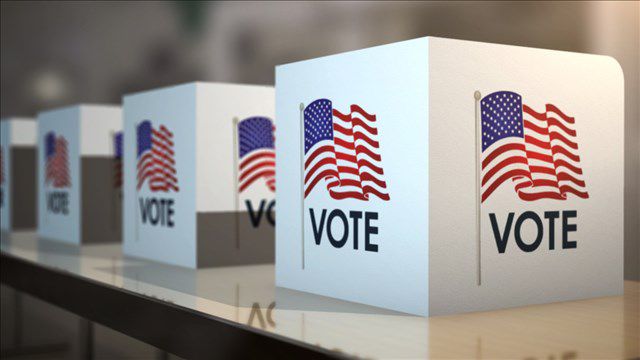By Dara Kam, The News Service of Florida
TALLAHASSEE — Additional restrictions on the state’s ballot-initiative process that take effect Tuesday could make it impossible for groups to gather enough signatures to place measures before voters next year, lawyers for plaintiffs challenging the new law argued Monday.
Florida Decides Healthcare, a political committee sponsoring a proposed constitutional amendment aimed at expanding Medicaid coverage, quickly filed the federal-court challenge last month after the Republican-controlled Legislature and Gov. Ron DeSantis approved the law. Smart & Safe Florida, a committee behind a proposed constitutional amendment that would allow recreational marijuana, also is a plaintiff in the case.
Also, a committee proposing a measure aimed at ensuring access to clean water has joined the challengers.
U.S. District Judge Mark Walker held an all-day hearing Monday as he considered the committees’ requests for a preliminary injunction to block parts of the law.
Smart & Safe Florida’s request focuses, in part, on a requirement in the law for petition collectors to be Florida residents. Initiative sponsors could face $50,000 fines for each petition collector violating the restriction, which also bans petition gathering by non-U.S. citizens and people who have been convicted of felonies and have not had their voting rights restored.
Glenn Burhans, an attorney who represents Smart & Safe Florida, told Walker that the prohibition against out-of-state workers “significantly burdens” the committee’s First Amendment rights to speech and association. He said the restriction will prevent the committee from using more than a third of its workforce who live outside of Florida and who were hired before the bill (HB 1205) passed this spring. The out-of-state workers are highly trained, experienced and have some of the highest validity rates for petitions, according to Burhans.
“They weren’t just picked willy-nilly,” he told the judge. “They were really good at their jobs and they would enhance Smart & Safe’s chances of making the ballot.”
Burhans also argued that the law violates the First Amendment because it isn’t “narrowly tailored” enough to achieve the state’s intended purpose of combating and investigating petition-related fraud.
With the out-of-state workers, Smart & Safe Florida was gathering petitions on pace to surpass the 880,000 signatures required to be submitted to elections officials by Feb. 1 for placement on the 2026 ballot, according to Burhans.
But the restriction against workers who aren’t Florida residents has dropped the signature collection from roughly 78,000 per week “to less than a third of that overnight,” he said.
“It limits the audience. It limits the speech. Period,” Burhans said.
Florida Decides Healthcare has asked Walker to block part of the law that places a three-month freeze on petition verification; a restriction limiting people who have not registered with the state from possessing more than 25 completed petitions, in addition to their own and those of certain family members; and criminal sanctions and fines associated with violations of the law.
The moratorium on petition verification by supervisors of elections is slated to last from Tuesday through Sept. 30. Supervisors have 60 days to verify petitions, meaning the number of verified petitions might be unknown until late November, attorney Ben Stafford told Walker.
The moratorium will have a negative impact on Florida Decides Healthcare’s ability to recruit volunteers and will dampen contributions from supporters, in part because they won’t be able to tell if the effort is gaining enough traction with voters.
In addition, the costs to verify petitions, which are borne by groups backing the proposals, has dramatically increased. As an example, one county that used to charge $1 per petition has quadrupled the cost to $4 per petition, Stafford said.
“Do the math on that,” said Stafford, an attorney with the Elias Law Group, a prominent national elections-law firm.
He likened the challenge of getting a proposal on the ballot to “being forced to run a marathon around the state at the same time the state is depriving us of oxygen.”
The moratorium’s “only purpose is to harm our campaign,” Stafford argued.
But Mohammad Jazil, who represents Gov. Ron DeSantis’ administration, said supervisors of elections requested the moratorium so they could come into compliance with other parts of the law.
Jazil noted that the Medicaid proposal failed to gain significant support during the past two election cycles. Florida Decides Healthcare has collected less than $1.2 million since the effort was launched in 2018, and gathered just 90,000 signatures in the last election cycle. So far, the group has submitted about 19,000 valid signatures for the 2026 ballot.
The suggestion that the Legislature “would go out of its way” to target the Medicaid proposal, which twice “failed miserably” on its own efforts, “strains credulity,” Jazil said.
“That doesn’t hold water,” he added.
Other plaintiffs in the case include backers of the initiative seeking to protect the right to clean water; Poder Latinx, a group which represents Hispanic voters and their communities; and the League of Women Voters of Florida.
Walker did not immediately rule on the requests to block the law, which means that many of the challenged provisions will go into effect on Tuesday. Walker said he hoped to issue an order in the coming weeks.
The plaintiffs also argued Monday that a registration requirement for petition gatherers is frightening volunteers, who were allowed to handle an unlimited number of petitions in previous years.
Ana-Christina Acosta Gaspar De Alba, the organizational director for Florida Decides Healthcare, said that many volunteers don’t want to give out their personal information.
“Without them … we’re sunk,” she said.
People who register to collect petitions have to provide information including their names, addresses and phone numbers, as well as the last four digits of the Social Security numbers.
“A lot of this is government information that the government has,” Jazil said. “What we’re trying to do is use it to track suspect petitions.”

